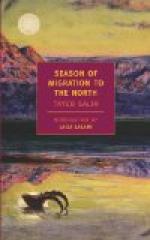At Fort Smith we leave the steamer Mackenzie River to take passage in the Grahame from Smith’s Landing, and once more essay the Mosquito Portage. We find our winged friends in fine fettle. Their eyes are not dimmed, their strength not abated. For miles we notice blackened and dead stems of young spruce, cut off as if by machinery, at a uniform height of two and a half feet from the ground. The top of the dead stem shows the depth of the snow when the rabbits, running along the surface, had nibbled off and eaten the growing spruce. A fur-trader at our side says, “While at Fort Macpherson I noticed that the ice always melted in the spring in Peel’s River before it did in the Mackenzie. It would break up in the Peel about the Queen’s Birthday and begin to go out. Reaching the Mackenzie, it came up against a solid mass of unbroken ice which sent it back to flood the whole country. It was a curious experience to paddle round in a canoe for miles and miles where one had set rabbit snares but a few weeks before. The poor rabbits themselves were at a loss, for no kind monition apprised them of the coming flood. We could see whole colonies of them,—each a shipwrecked sailor on his own little raft of bark, buffeted here and there with the stream and peering out across the swollen waters, like Noah’s dove, seeking some green thing.”
CHAPTER XVIII
TO MCMURRAY AND BACK TO THE PEACE
“Think o’ the stories round the camp, the yarns along the track— O’ Lesser Slave an’ Herschel’s Isle an’ Flynn at Fond du Lac; Of fur an’ gun, an’ ranch an’ run, an’ moose and caribou, An’ bull-dogs eatin’ us to death! Good-bye—good luck to you!”
Our arrival at Chipewyan is opportune. Honorine Daniels, unceremoniously known as ’Norine among her friends (and they are legion), is about to join hand and fortune with one of the Mercredi boys. ’Norine owns a cottage in her own right, and to-night under her roof-tree there is to be a wedding-dance. We wait round, hungering for an invitation, finally to be told largely, “You don’t need no invitation, everybody goes.”
We go with the crowd. The room is full to overflowing. Babies are deposited on the benches along the wall, dogs look in at the window. The air is heavy with mosquitoes and tobacco-smoke. But joy reigns. Nobody is too old or too obese to dance. Old Mr. Loutit and lame Jimmy Flett each secures a sonsy partner. There are three fiddlers, and these relieve each other in turn, for fiddling, beating time with your moccasin on the earthen floor, and “calling out” is hard work for one man. There are but two kinds of dances,—the Red River jig, and a square dance which probably had for honourable ancestors the lancers on the father’s side and a quadrille on the mother’s.
Endurance is a sign of merit in the Red River jig. A man or woman steps into the limelight and commences to jig, a dark form in moccasins slips up in front of the dancer, and one jigs the other down, amid plaudits for the survivor and jeers for the quitter.




